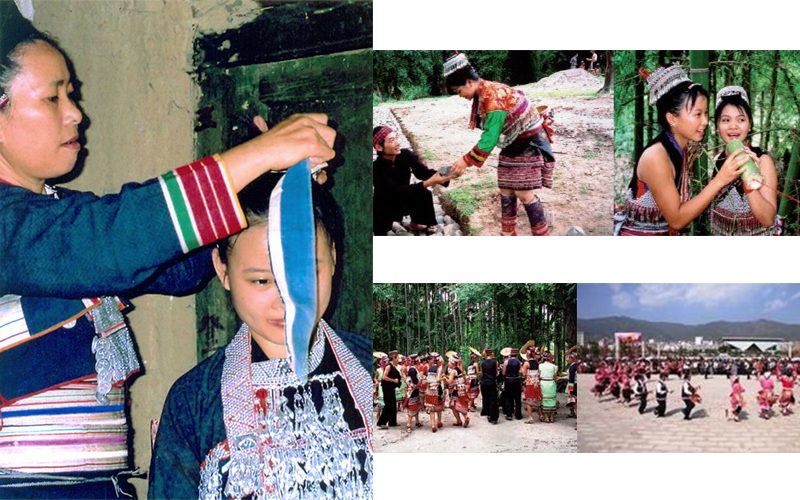 alt="Puer Surrounding Counties and Towns: Weekly & Special Local Markets Travel Guide"
/>
alt="Puer Surrounding Counties and Towns: Weekly & Special Local Markets Travel Guide"
/>
Rituals of Life Cycle of Dai Ethnic Minority in Xinping County, Yuxi
The Dai people (傣族) of Xinping County (新平县), especially the subgroup known as the “Huayao Dai” (花腰傣), have a rich and colorful array of life rites and customs. These practices reflect not only the unique cultural identity of the Dai but also embody profound historical and cultural significance. Below is a detailed introduction to the life customs of the Dai people in Xinping:
Marriage Customs
Courtship and Proposal
Dai young men and women enjoy relatively free social interactions before marriage. Romantic relationships are often initiated through practices like “visiting girls” (串姑娘). In Huayao Dai (花腰傣) areas, young people seek their loved ones during the Huajie Festival (花街节). They express affection by gifting “yangmie rice” (秧篾饭), a traditional love token. Held from the 13th to 15th of the first lunar month, the Huajie Festival is one of the most grand celebrations for the Huayao Dai, where youth dress in elaborate costumes to showcase their beauty and talent while searching for a partner.
Wedding Ceremony
Weddings are a major milestone in Dai life. The ceremonies usually span two days:
Day One: Held at the bride’s home, with the entire bamboo house living room filled with banquet tables. A small round table in the back holds gifts for the groom: new clothes, a plate filled with RMB cash, two cooked chickens, a pair of bananas, a bundle of white thread, and a plastic basin containing a bag of salt—symbolizing a pure and happy marriage.
Tying Thread Ceremony: The couple kneels side by side in front of the table to receive blessings. An elder recites blessings, after which the wedding officiant loops white thread from the groom’s right shoulder to the bride’s left and then onto the table, symbolizing the spiritual binding of the couple. The thread is also used to tie the roosters’ combs. The bride’s relatives then take turns tying thread for the newlyweds. Afterward, a family member hands over the clothing gifts to the groom, and the couple retires to their room, completing the ceremony.
Clothing Culture
Huayao Dai Attire
The Huayao Dai (花腰傣) are famous for their distinctive clothing. Women wear short, open-front jackets with black skirts adorned with colorful strips and silver bubbles, forming intricate and dazzling patterns. These outfits are not only beautiful but also rich in decorative symbolism.
Men’s Attire
Men wear short jackets without collars, either with side or front openings, and long trousers. Their heads are wrapped with cloth in white, pink-red, or blue.

Food Customs
Signature Foods
The Dai favor glutinous rice and enjoy foods like bamboo tube rice, sour bamboo shoots, and sapie (撒苤), a raw meat salad. They also consume insects such as cicadas, bamboo worms, and ant eggs, prized not only for their taste but also for medicinal value.
Alcohol and Tea Culture
Dai people enjoy drinking alcohol, usually home-brewed with a low alcohol content and sweet aroma. Tea is also a local specialty, particularly large-leaf tea consumed without added flavorings.
Housing Customs
Stilt Houses
Dai dwellings are typically stilt houses (干栏式建筑) made of bamboo, designed for ventilation, sun protection, cooling, and resistance to rain and humidity. The upper floor is for living, while the lower is used for livestock and storage.
Religion and Festivals
Religious Beliefs
The Dai generally follow Theravada Buddhism (小乘佛教), and many of their festivals are linked to religious practices. The Water Splashing Festival (泼水节) is one of the most important, held in the sixth month of the Dai calendar (mid-April in the Gregorian calendar), symbolizing renewal and a fresh start.
Huajie Festival
As mentioned, the Huajie Festival (花街节) is a key event where young people gather to find potential partners through various traditional activities.
Other Customs
Childbearing Customs
Among the Huayao Dai (花腰傣), children are considered a divine blessing. If a woman remains childless two to three years after marriage, she may pray for fertility by sacrificing a chicken and offering eggs to a large tree or sacrificing a duck by the river to the water deity Pinan (匹南).
Pregnancy Customs
Pregnancy is a joyful event. The entire family takes great care of the expectant mother. Prenatal education is emphasized; pregnant women are encouraged to stay cheerful, behave gracefully, and avoid negative influences to foster a healthy environment for the baby.
Birth Customs
At birth, a “mother-hen sacrifice” (认母鸡) is performed, and a rice-sharing feast (祝米客) is held to celebrate and receive blessings from relatives.
Naming Customs
- Milk Name: Three to four days after birth, the child is given a “milk name” that reflects hopes for their health and strength.
- School Name: Upon reaching school age, a formal name is given, symbolizing hopes for academic success and a bright future.
One-Month Celebration
When the baby turns one month old, the family hosts a celebration. Men catch fish or shrimp from the river or fields to “break the vegetarian diet,” symbolizing the child’s future ability to hunt and fish, signifying survival skills.
First Birthday Ceremony
A first birthday ritual (周岁礼) is held on a chosen auspicious day. A chicken is sacrificed to honor ancestors, and the baby participates in a “object-grabbing” activity (抓周) to predict future interests and paths. A local embroidery master may also be invited to divine the child’s fortune.
Coming-of-Age Ceremony
At ages seven or eight, children undergo a coming-of-age ritual, marked by changing into youth attire, signifying entry into a new life stage with more responsibilities and education.
Coming-of-Age Customs
At the age of seventeen or eighteen, a coming-of-age ceremony is held. For young girls of the Huayaodai (花腰傣) ethnic group in Xinping County (新平县), one of the most important rituals is the hair-coiling ceremony (盘头). A lucky day is selected for the hair to be coiled, and three days later, the girls dress in bright and luxurious adult clothing. After completing this ceremony, they are allowed to participate in the Huajie Beauty Contest (花街比美), where young men and women can express affection for their chosen partners and share their feelings openly.
Tattoo Customs
Tattooing is a traditional custom among the Dai (傣族) people, and it is quite prevalent among the Dai in Xinping County (新平县). Tattoos are typically inked on the arms and wrists, often featuring symbolic patterns that represent protection, blessings, or the transition into adulthood.
Tooth-Dyeing Customs
Tooth-dyeing is another traditional Dai custom. It usually involves chewing betel nuts or using the juice of certain plants such as sour pomegranate to stain the teeth black or brown. This practice is believed to strengthen the teeth and is also considered a symbol of beauty, marking a girl’s transition into womanhood.
Conclusion
The life customs of the Dai people in Xinping County (新平县) are rich, complete, and systematic, encompassing every stage of life from the desire for children to funeral rites. These customs not only reflect the cultural characteristics of the Dai ethnic group but also carry profound historical and cultural significance. Through these customs, the Dai people preserve their traditions, express their love for life, and demonstrate their reverence for nature.
For Chinese version please go to:
http://www.ynich.cn/view-ml-11111-1169.html

 7 Days GolfingTour
7 Days GolfingTour
 8 Days Group Tour
8 Days Group Tour
 8 Days Yunnan Tour
8 Days Yunnan Tour
 7 Days Shangri La Hiking
7 Days Shangri La Hiking
 11 Days Yunnan Tour
11 Days Yunnan Tour
 6 Days Yuanyang Terraces
6 Days Yuanyang Terraces
 11 Days Yunnan Tour
11 Days Yunnan Tour
 8 Days South Yunnan
8 Days South Yunnan
 7 Days Tea Tour
7 Days Tea Tour
 8 Days Muslim Tour
8 Days Muslim Tour
 12 Days Self-Driving
12 Days Self-Driving
 4 Days Haba Climbing
4 Days Haba Climbing
 Tiger Leaping Gorge
Tiger Leaping Gorge
 Stone Forest
Stone Forest
 Yunnan-Tibet
Yunnan-Tibet
 Hani Rice Terraces
Hani Rice Terraces
 Kunming
Kunming
 Lijiang
Lijiang
 Shangri-la
Shangri-la
 Dali
Dali
 XishuangBanna
XishuangBanna
 Honghe
Honghe
 Kunming
Kunming
 Lijiang
Lijiang
 Shangri-la
Shangri-la
 Yuanyang Rice Terraces
Yuanyang Rice Terraces
 Nujiang
Nujiang
 XishuangBanna
XishuangBanna
 Spring City Golf
Spring City Golf
 Snow Mountain Golf
Snow Mountain Golf
 Stone Mountain Golf
Stone Mountain Golf












 What Our Customers Say?
What Our Customers Say?
